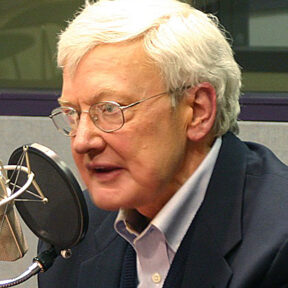
Roger Ebert
Photo from Wikimedia Commons / Author of Photo: Sound OpinionsOverview
* Movie critic
* Outspoken on political matters
* Great admirer of filmmaker Michael Moore
* Died in April 2013
Roger Ebert was born in June 1942 in Urbana, Illinois. He graduated from the University of Illinois at Urbana-Champaign, where he edited the student-run newspaper, The Daily Illini. He attended graduate school at the University of Cape Town in South Africa, and was a doctoral candidate in English at the University of Chicago. In 1967 Ebert was offered a position as a professional film critic for the Chicago Sun-Times. He became a prominent movie reviewer, author, and entertainment critic. In 1975 Ebert was awarded the Pulitzer Prize for Criticism, becoming the first film critic to win the honor.
A year later, Ebert joined fellow film critic Gene Siskel of the Chicago Tribune in hosting a weekly film review program, Siskel & Ebert at the Movies, which would go through several incarnations over its 22-year existence, eventually achieving syndication and widespread acclaim.
When Siskel died in 1999, Ebert teamed with fellow Chicago Sun-Times columnist Richard Roeper on a new show titled Ebert & Roeper and the Movies (later renamed At the Movies with Ebert & Roeper in 2007).
In the fall of 2000 Ebert gave a rave review of The Contender, writer-director Rod Lurie’s film about a female senator, nominated to replace a dead vice president, who nobly refuses to address Republican-spread rumors that she had been involved in college orgies. Lurie’s intent was to liken the treatment of his heroine-under-fire to the treatment Bill Clinton had received during the Monica Lewinsky scandal. Ebert called The Contender a four-star classic; he also devoted part of his review to criticizing Republicans and Kenneth Starr, the Special Prosecutor who had handled the Clinton-Lewinsky matter.
After that, Ebert used his media platform numerous times to speak out on political matters. For example:
In a July 2001 Sun-Times general-news column, he depicted presidential daughter Barbara Bush as an ignorant “yob” whose alleged intellectual deficiencies were reminiscent of her father’s. About the President, Ebert wrote: “That the president of the United States cannot get himself from his bulletproof Cadillac limousine to lunch with the queen without being caught in the rain is perhaps an insight into his need for a missile shield…. George W. Bush was so indifferent to the world that in the years before he became president he made only two overseas trips, both for business, neither for curiosity. No wonder he wants to beak the missile treaty, alienate NATO, ignore global warming and reinstall Russia and China as enemies: Those foreign countries scarcely exist in his imagination.”
Ebert likened the Bill the Butcher character in the 2002 film Gangs of New York — a cleaver-waving mass murderer — to Florida’s former Secretary of State, Katherine Harris, whom Gore supporters condemned for what they perceived as her partisan role in the 2000 Presidential election controversy in Florida. Ebert’s contention, which he expressed on Ebert & Roeper, was that both Bill the Butcher and Harris were obsessed with grabbing and maintaining power by any means necessary.
In the August 2003 issue of The Progressive, Ebert asserted that President Bush was a devious, unintelligent religious zealot who had stolen the 2000 Presidential election: “The Bush theory, of course, is that he has a personal dialogue with God: God talks to Bush, Bush talks to God. And Bush gets God’s message, and Bush really believes that God’s on his side. The problem with that is Bush then can’t change his mind because God isn’t going to change his mind. And so what we have here really is a rather alarming situation where religion in the White House has crossed the line between church and state.”
In his spring 2003 review of The Life of David Gale, a melodrama about an anti-death-penalty crusader, Ebert condemned Bush’s allegedly vicious insensitivity toward those on Texas’ Death Row.
Ebert boasted of his past affiliation with the Students for a Democratic Society in his review of the 2003 documentary The Weather Underground: “I still have my membership card in Students for a Democratic Society,” he wrote, “signed by Tom Hayden, who handed it to me at a National Student Congress in 1963, and tucked the $1 membership fee in the pocket of his flannel shirt.”
In 2004 Ebert lauded the Michael Moore documentary Bowling for Columbine. In his review of Moore’s 2004 anti-Bush film Fahrenheit 9/11, Ebert did not critique the movie per se, but rather used the occasion to parrot claims made in the film, including: “Bush is incompetent, dishonest, failing in the war on terrorism, and has bad taste in friends.” (With Ebert’s support, Moore had sold his first documentary Roger and Me to Warner Brothers in 1989 for $3 million.)
Ebert depicted U.S. businesses as perpetrators of “corporate terrorism” in his review of the 2004 remake of The Manchurian Candidate. In the original 1962 film, a Korean War veteran is brainwashed into becoming an assassin by Communists. In the updated version, a Gulf War veteran is kidnapped and programmed by corporations in a plot to seize the White House. “It’s a stretch,” Ebert wrote, “to imagine a communist takeover of America, but the idea that corporations may be subverting the democratic process is plausible in the age of Enron.”
Ebert criticized the Iraq War in his review of the 2007 Brian DePalma film Redacted: “Why should it be a mystery that the Iraqis do not love us? Did our mothers not ask us, ‘How would you feel if someone did that to you?’ Yes, they [Iraqis] are killing us [Americans], too, but they live there…”
In addition to his career as a critic, Ebert taught film theory at the University of Chicago.
Ebert died of cancer on April 4, 2013.
For additional information on Roger Ebert, click here.